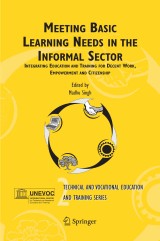Details

Meeting Basic Learning Needs in the Informal Sector
Integrating Education and Training for Decent Work, Empowerment and CitizenshipTechnical and Vocational Education and Training: Issues, Concerns and Prospects, Band 2
|
96,29 € |
|
| Verlag: | Springer |
| Format: | |
| Veröffentl.: | 28.09.2005 |
| ISBN/EAN: | 9781402034275 |
| Sprache: | englisch |
| Anzahl Seiten: | 250 |
Dieses eBook enthält ein Wasserzeichen.
Beschreibungen
In advancing the vision of adult learning articulated at the International Conference on Adult Education (CONFINTEA V) held in Hamburg in 1997, the UNESCO Institute for Education has been conducting studies on the different areas and dimensions of ‘Adult Learning and the Changing World of Work’. One question that has been central to this area is: What constitutes adult learning for those who traditionally secure their survival in the informal economy, as well as for those school leavers and dropouts who are forced to work in this sector? In answering this question, the informal sector or popular economy may be defined in various ways, but there is an increasing recognition that it is a phenomenon that has come to stay and that government policies aimed at economic and social development, including national education and training policies and programmes, should target those who work in this sector. In particular, basic education and continuing education and training are being seen as key to empowering people and as crucial to strategies for reducing poverty. Moreover, there is a growing awareness that education is a human right of fundamental siginificance to promoting decent work and humane living conditions. It is in view of such considerations that UIE and the ILO planned to conduct studies in South Asia (Nepal, Bangladesh, India) to develop an understanding of the quality provision of education and skills development in and for the informal sector.
Cross-Cutting Themes.- Schooling and Basic Skills: Training Programmes and Challenges in the Informal Sector: Latin America.- Informal Learning and the Role of Social Movements.- The Informal Sector: Non-Formal Education Settings for Working Children.- Institutional Support Structures and Modes of Skills Transmission.- Gender and the Informal Economy in Latin America: New Challenges and Possible Answers for Labour Training Policies.- Trade Unions and Adult Learning for Women Construction Workers in the Informal Sector.- Country Studies.- Skills Formation for the Informal Sector in Bangladesh: A Strategic Framework.- Training and Skills Development for Decent Work in the Informal Sector: Case Studies from South India.- Education, Training and Skills Formation for Decent Work in the Informal Sector: Case Studies from Northern India.- Educational Reform for Linking Skills Development with Employment in Nepal.- Training in Modest Housing Construction for Those Who Need it Most: An Example from Nicaragua.
<P>"This anthology brings together basic facts and features about basic learning needs and skills of people working and living in the informal economy and presents case studies from different countries examining educational and training strategies for meeting these learning needs. It portrays the grave problems facing educational and training systems vis-á-vis informal sector workers, even as they look at holistic solutions that take into account principles of lifelong learning and innovations in informal, non-formal and formal adult learning, and show a growing awareness that education is a human right of fundamental significance to promoting decent work and humane living conditions. The size, diversity, and the strength and sheer tenacity of workers and owners in the informal sector as well as the stress on globalisation and technological changes have combined to bring about a reappraisal of the links between education and training and the informal labour market. </P>
<P></P>
<P>The book looks at the interlinkages between EFA and work and takes the stance that promoting the right to basic education is crucial for overcoming oppression and indecent working conditions. Basic education in its current state is not imparting the necessary skills for entry to the labour market. In view of this gap, the case studies pose the crucial question of what essential skills and which basic learning needs have to be addressed for productive and decent work. </P>
<P></P>
<P></P>
<P></P>
<P>The book looks at the interlinkages between EFA and work and takes the stance that promoting the right to basic education is crucial for overcoming oppression and indecent working conditions. Basic education in its current state is not imparting the necessary skills for entry to the labour market. In view of this gap, the case studies pose the crucial question of what essential skills and which basic learning needs have to be addressed for productive and decent work. </P>
<P></P>
<P></P>
Diese Produkte könnten Sie auch interessieren:

University Science and Mathematics Education in Transition

von: Ole Skovsmose, Paola Valero, Ole Ravn Christensen

96,29 €















